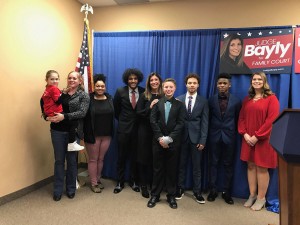
Curious alpacas pose for the camera. Photo courtesy of Ms. B-Haven’s Alpaca Farm.
BY JENNIFER CROWLEY
Nearly 15 years ago, two women set off to attend a fiber arts festival. Barb Scutt’s interest in the event was spurred by her love of alpacas, animals that are bred for the fiber in their fluffy coats. Little did Beverly Hazelton, Scutt’s sister-in-law, know how her decision to attend the festival with Scutt would change the course of their lives. Upon leaving the event, the women were tossing around the idea of starting an alpaca farm in their hometown of Wheatland. After getting husbands Dan Scutt and Chuck Hazelton on board with the notion, hours of research commenced.
Only a short time later, the family erected their first barn and hung their sign: The Ms. B-Haven Alpaca Farm. Three bred females moved in and before long, a male joined them. On the eve of Independence Day in 2004, the farm’s first baby alpaca (called a cria) was born.
Fast forward to 2018 and the North Road farm, now comprised of three separate barns, is home to 46 alpacas each with their own name and unique personality. They share their habitat with ducks, three goats and a miniature donkey named Howard that even has his own social media following.
Though the farm has expanded with the addition of other animal breeds, the alpacas remain the center of attention. The women happily exhibit the warm and fuzzy creatures at community events all over the area in order to educate children and adults about their unique flock. While other nearby farms may have an alpaca or two, when it comes to raising, shearing, and breeding alpacas, Ms. B-Haven is in a league of its own.
Alpacas are native to South America; herds graze on the Andes mountain chain. They are often confused with llamas despite being smaller in stature. Another difference between the breeds is that only llamas are working animals. Alpacas are bred for their fiber which is used to knit and weave items of warmth such as blankets, scarves and ponchos. In South America there are more than 50 natural fiber colors.
When asked what else the general public might not know about alpacas, Hazelton first confirmed the rumor that yes, when aggravated, an alpaca will spit, though most commonly at each other. “But if you were to touch a bred female on her back, you’ll probably get spit at,” she added. As for the fiber that can be spun out of the alpaca’s coat, “It is strong, hollow, and dry and actually much warmer than wool, up to six times warmer in fact. The fiber is also hypoallergenic because it doesn’t have the landline oil in it. It is very soft and cuddly,” Hazelton added.
Once the alpacas are sheared, the farm sends the fiber to a co-op pool. From here products are made and returned back to the farm where they are sold. In addition to the co-op relationship, the farm also sells many items which are in high demand around the holidays. “We sell anything and everything that can be made from alpaca fiber — so hats, sweaters, blankets, mittens, socks, and yarn which is labeled with the name of the exact animal it came from. And if we don’t have what someone is looking for, Barb or I could probably make it,” said Hazelton.
The farm store opens by appointment for anyone that can’t wait for their regular hours on Saturdays each December.
As for special events held at the farm, there are two big annual gatherings. In the spring there is a shearing festival. “Because really, alpacas look very silly naked,” according to Hazelton. In addition to a laugh, event-goers can help with the shearing process while also learning about how to care for alpacas. “For the ultra crafty person we even sell the fiber directly off the alpaca. On shearing day you can see it on the animal before it’s shorn and purchase it then.”
The other major event at Ms. B-Haven’s happens each September in conjunction with “National Alpaca Farm Days.” An annual open house draws families from all over the area who are interested in seeing the farm, feeding the animals and learning all about the docile alpacas. For example, like their human minders, alpacas enjoy cooling off with a fan and a pool in the summer. Unlike humans, alpacas prefer bathing in dust.
With the cold weather rapidly approaching, a warm blanket sure sounds nice. Want to check out the farm and the store? Take a look at www.msbhavenalpacas.com for up-to-date hours and contact information.







